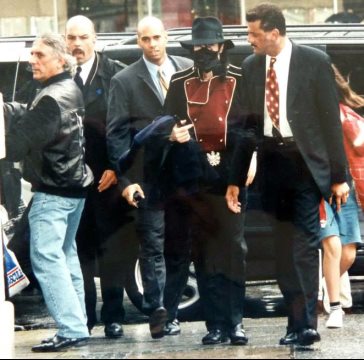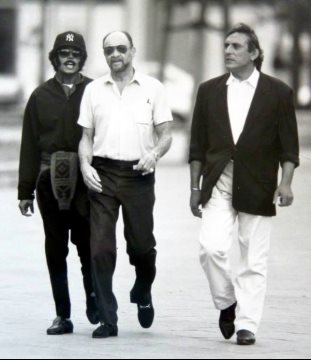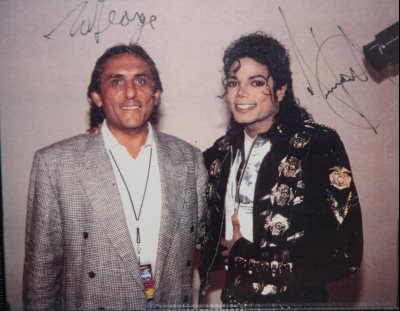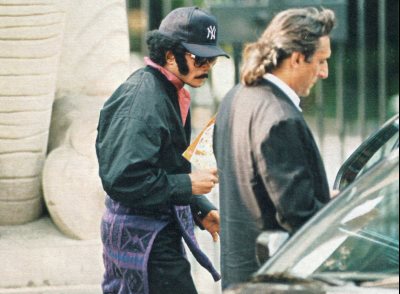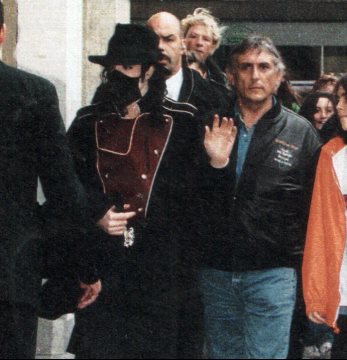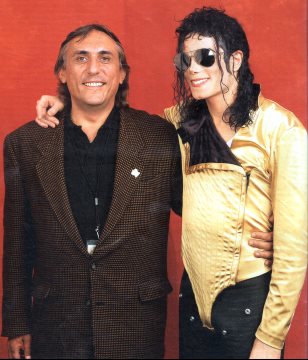Interview with George Kerwinski
Part 3
— George, now a few serious questions connected with your work.
What things, to your mind, fans are allowed to do on Chris’s gigs and what are not?
 — I don’t really think in those terms. I mean, they come to see the show. A lot of them are more fanatic than others, and those people want to see or get as close to the artist as they can. If they just enjoy it... I mean, in Germany or at the rest of the world that we toured they would stand up and run to the front of the stage or Chris would ask them to come forward. And that was the difference to Russia where people stayed in their seats, even if they applauded and that was it. And it was sometimes difficult because the local officials were always worried about riots. But there was no riots.
— I don’t really think in those terms. I mean, they come to see the show. A lot of them are more fanatic than others, and those people want to see or get as close to the artist as they can. If they just enjoy it... I mean, in Germany or at the rest of the world that we toured they would stand up and run to the front of the stage or Chris would ask them to come forward. And that was the difference to Russia where people stayed in their seats, even if they applauded and that was it. And it was sometimes difficult because the local officials were always worried about riots. But there was no riots.
The only thing that I don’t like, if after the show fans are too pushy, if they are trying to be tricky to get backstage. Or they turn up with some silly excuses like “I met Chris 10 years ago and I’ve got a photo with him, and I’m sure he remembers me, and I want to say hello...” I mean, it doesn’t matter if it’s Chris Norman or anybody, you just don’t turn up backstage and hassle people while we are working that I want to say hello. To be quite honest, most artists really, when they leave the hall or the venue, on the way to their transport, as long as the fans are waiting there patiently, they will get what they want. They may have a picture, they can get the autograph. I just don’t like when they get pushy and push other people out of the way and think they are more important than others.
They should just keep their calm, and if they are told that the artist will sign, they should wait outside, he will sign on the way to the car. If we tell them that, then that’s how it is. They should just trust that and wait there patiently and then they get what they want. The more excited they get and want to get passed that, the less the chances are that they actually do get to the artist.
— And they shouldn't annoy and come to the hotel?..
— That have reduced itself over the years. The first years in Russia we were always wondering, how do the people know, because in big cities there are so many hotels, how do they know Chris Norman is staying in that particular hotel? But then again we realized soon that anybody could just call up any hotel and ask for Mr.Norman, and if he was staying there, they would say, yes he is here and they might even connect him to the room. So we had to tell them beforehand about that, and that’s what we had to learn here. We had to make sure the reception doesn’t call, if somebody calls and wants to speak to the artist. They would put them through to my room and not to the artist himself.
 And another thing that if these people come to the hotel, even if they know where the artist is staying, we’d be willing eventually to talk to them or make photos or whatever. For instance, after a show the artist gets back to the hotel, he goes to the bar or to the restaurant, and he seats and wants to eat something or talk to the band, first of all. When people rush in and force the artist, then he doesn’t want that. Just take your time, let him eat first, finish his meal, don’t disturb him while he’s eating: “Can I have a picture, can you sign this?” That’s the kind of things I don’t like. I mean, that’s a personal feeling that everybody should have, to know when it’s the right time to move in, you know.
And another thing that if these people come to the hotel, even if they know where the artist is staying, we’d be willing eventually to talk to them or make photos or whatever. For instance, after a show the artist gets back to the hotel, he goes to the bar or to the restaurant, and he seats and wants to eat something or talk to the band, first of all. When people rush in and force the artist, then he doesn’t want that. Just take your time, let him eat first, finish his meal, don’t disturb him while he’s eating: “Can I have a picture, can you sign this?” That’s the kind of things I don’t like. I mean, that’s a personal feeling that everybody should have, to know when it’s the right time to move in, you know.
— In your first years of touring with Chris many of us could see and even feel :) that you were very strict and tough man. I think, last years you have changed and become much softer. In this connection, what do you think, should a tour manager surely be tough, strict in order everything to go well?
— Well, my job really is not only to do the best I can for the artist but also to protect him from outside influences. That was part of it. We were very strict with that in Germany, in backstage, even with press people. We always kept most people away from the artist as good as we can. And then I didn’t make a difference if it was a journalist or it was a fan or... We just kept the backstage area clean. Whatever they want from the artist, there will be a time that it can be arranged. And I don’t know really “soft” tour management. My problem that I have a bit of a temper and when there’s a problem I got loud and people are scared to shit, I know that myself. Now I calmed down a lot and I’m a lot more human, so to say :). But I mean, you have to be tough. It’s not meaning the fans, also you have sometimes to make a point with local promoters because they take it wrong. You just have to be strict and sometimes really to make a point. The friendlier you are, the more they take liberties.
— Especially here in Russia.
 — Yeah. They think, once you are friendly to them, they can get anything from you. They ask for the most ridiculous things. They would even go and knock on Chris Norman’s door, on the artist’s door because they think: “Oh, he’s so friendly, I’m sure he doesn’t mind”. Or call him or invite him out or... They get really annoyed. Because once you are travelling, you have a routine. And they always want the best for you and themselves, they want to take you to a place and show their hospitality and all that. But you can’t expect it from an artist in every city, especially after the show. Because we are not on a travelling holiday to be entertained. We come to entertain at the show and then we travel again. And so you have to keep that all a bit more strict. And coming from Germany, I was very German in my working ways (laughs).
— Yeah. They think, once you are friendly to them, they can get anything from you. They ask for the most ridiculous things. They would even go and knock on Chris Norman’s door, on the artist’s door because they think: “Oh, he’s so friendly, I’m sure he doesn’t mind”. Or call him or invite him out or... They get really annoyed. Because once you are travelling, you have a routine. And they always want the best for you and themselves, they want to take you to a place and show their hospitality and all that. But you can’t expect it from an artist in every city, especially after the show. Because we are not on a travelling holiday to be entertained. We come to entertain at the show and then we travel again. And so you have to keep that all a bit more strict. And coming from Germany, I was very German in my working ways (laughs).
— What would you like to do more in your life? Maybe not in the music business? Whom could you be if you wasn’t in that business?
— Footballer. If I wouldn’t have ended up in the music business, I would have liked to become a professional footballer. Because I played for Bayern Munich for 6 years in the youth team. When I was 17, I got to know Beckenbauer, Schwarzenbeck and a goalkeeper Maier. We were all about the same age and I played for 2 years with them in the youth team.
— How did you manage to get there?
— After I left the home where I grew up, I went back to live with my mother. And being 15 years old I became a member of Bayern Munich in the club. And I played in the B team, in the youth team. I was a top scorer. When I was young, I always trained my left foot because I’m actually a right footer. But then I was so good with both feet that I played left wing. Although I could have played right wing too, but in the youth team, when I played with Beckenbauer, he was playing right wing, he was a winger. And then he had a knee injury and at that time he started to play midfielder and the back years later. When we were at the same age I was offered a contract, in those days it was semi-professional. It was half-amateur but you did get a little money, there was not much money in it anyway. So I got offered a contract at the same time as Beckenbauer, Schwarzenbeck and Sepp Maier. But I was not 18, I could not sign the contract, my mother would have to do it. And she didn’t sign it. So they became professional and I didn’t.
— But why your mother didn’t sign the contract?
— Because there was no money in football in those days. She wanted me to work in the factory which I did. I worked at Siemens, I’d been to the training in Bayern Munich twice a week and played football at the weekend. But she just did not want me to become semi-professional or something, she thought it would take too much time. Because she was also living of the money that I was earning, I had to pay her. That’s why she didn’t sign it, she was not interested. And if it would have been these days when young people that get contracts get already a lot of money then, for signing... If the money situation would have been like today, my mother would have been the first one to sign it :).
Then in England, when I had the restaurant, I played too in a league, in the Essex league. I was the oldest in the team there, I was 36 by then. The defender behind me was half of my age, he was 18. I was 36 and I still was playing left wing in the Essex league.


— What is it, the Essex league?
— It’s amateur league, it’s maybe under 4th or 5th division or kind of that. I went to training twice a week and at weekend we played. And I was still the fastest in the team, with my 36 years. To play in English football, this is where football comes from, for me this was like... Just a fact that I was playing there. I’ve got a thing... In the Essex league we got in the Cup final, in our round there. We lost the Cup final 1-0, but we got a black wooden thing from the British Football Association saying that we were there.
But the proudest thing I have is... And I didn’t know this was going to happen and that they handle it like this in England... Before every game our team captain – who was a bit younger than me, he was a school teacher – he always told the referee that I’m not English and I don’t speak. I spoke English well enough but not like I do now. So they always told him, if I don’t react when they call my number or something, it’s because I don’t speak. It was always the routine. And there was one game where the goalkeeper... I was passed, I outplayed the whole defense and I was around the goalkeeper, but he pulled my leg, twice! And both times the referee didn’t give a penalty. And when the goalkeeper did it the second time I was cursing him in English, “You f**** c****!!!” :))) Suddenly I was speaking all the English that I did... (laughs) And because of that, because the referee thought I don’t speak English, I got a yellow card! But it was ok. So I got a yellow card for using this bad language. But what I didn’t know, 2 weeks later I got a fine in the post, like for wrong parking. I had to pay 15 pounds fine for the yellow card. Yeah!.. I‘ve still got the document. I’m very proud for the Football Association, for yellow card, it cost me money like a parking ticket in England... (laughs).
— So the league was amateur but the fines were real? :)
— Yeah, that’s what I mean... The English rules, strict rules, yeah.
— Had you any official relationships with the Bayern football club?
— I was a member of the club when I played football for the club. But as a member you had to pay a fee every 3 months, every quarter. It was a Bayern Munich membership card that you could open up like a little book. And every 3 months you had to buy a stamp to put it into. This was allowing me to go to Bayern Munich football games for nothing, this was my entree.

— So all your life you are a big fan of Bayern...
— Yeah. And I became a Bayern Munich fan just by accident again. Because when I was a kid, when I played for Bayern in the team, there was a second Munich team – Munich 1860. They were on top of Bayern. When the Bundesliga was founded, Bayern was not in it, there were only the top teams. They sort of counted all the championships and then they put top 16 teams there. That’s when they divided first division and second division. Bayern was still in the second division. And once a friend of mine took me to the football stadium for my first football match that I saw live. Bayern Munich played a friendly game against I don’t know whom. If it would have been Munich 1860, I would have been the fan of theirs, I might have joined that club, I don’t know :). So it was just because somebody took me and he was a Bayern fan. As a teenager you take over what your friends like. It was just by pure accident really.
And then, it was also in those days... Do you remember, in the end of the 50s there was a terrible air crash in Munich where Manchester United’s half of the team died. And a lot of people that were on the plane survived, like Bobby Charlton who was on it. So every year on the day when this accident happened there was a charity game in Munich. In those days Munich 1860 and Bayern Munich merged as Munich. Munchen against Manchester United. And then the money went to the families of those people that were in the accident.
— And now you should probably feel happy more than ever because of the passed season when Bayern had won all the possible trophies including the Champions League? (that was asked in 2013)
 — Yeah. But not happier than ever. The funny thing is that the older you get... Not that I lost interest in football, but I’m not so fanatic anymore. I used to be, like Geoff is still, maybe because he’s just that bit younger than me. If I know the result of Liverpool and I would tell him... :) We had fights about it sometime, because he doesn’t want to know. When we are working and English football season is on, he records all the football and watches it when he goes home. I used to do that, fanatically. I was really angry if somebody told me the result. These days I take it a bit easier. But last season, I mean to win that triple, was of course something special. And I also went to Marienplatz when they were up on the balcony, with all the fans celebrating. I’ve been there couple of times when they won championships, because this is not far from where I live, I cycle there. Leave my bicycle somewhere and just walk around a bit, see the team on balcony and then I go home again. So I used to be a lot more fanatic about football and Bayern.
— Yeah. But not happier than ever. The funny thing is that the older you get... Not that I lost interest in football, but I’m not so fanatic anymore. I used to be, like Geoff is still, maybe because he’s just that bit younger than me. If I know the result of Liverpool and I would tell him... :) We had fights about it sometime, because he doesn’t want to know. When we are working and English football season is on, he records all the football and watches it when he goes home. I used to do that, fanatically. I was really angry if somebody told me the result. These days I take it a bit easier. But last season, I mean to win that triple, was of course something special. And I also went to Marienplatz when they were up on the balcony, with all the fans celebrating. I’ve been there couple of times when they won championships, because this is not far from where I live, I cycle there. Leave my bicycle somewhere and just walk around a bit, see the team on balcony and then I go home again. So I used to be a lot more fanatic about football and Bayern.
Anyway. So if I wouldn’t have ended up in the music business, I would have loved to become a professional footballer. But before that I wasn’t really in a position where I could choose what I wanted to learn, you know. That’s why I started to work in the factory at Siemens. At that time if I would have had the choice, I always wanted to become a journalist, a photographer or a footballer. But photographer was difficult because I didn’t have a camera (laughs). We were too poor to have a camera really or maybe a pocket camera. Journalist? I liked to... At that time I was writing poems, just for myself. I was writing things down. Did I ever show you? I’ve got some lyrics that I wrote, some rhymes. I showed it to Geoff, he wanted to put music to it.
— You wrote it these days?
— No, no, this was in the 70s or earlier. I was just writing things down that came to my mind, for no particular reason really. But also in the 70s at “Mama Concerts” we managed a band for a while, the German band called Wheels, it was a rock band. They recorded an album, and there’s 2 songs on the album that I wrote, the lyrics. When we discovered them, me and a friend of mine, we liked the band. They were called Wheels On Fire which is a Bob Dylan song title. So, to cut it down, we left “on fire” away and called them Wheels. And because of our connection with “Mama Concerts” we put them as a support band on European tours. They supported Uriah Heep, Meat Loaf, Manfred Mann Earth Band. And they did this album. We were in Berlin for 3 weeks in the studio recording it. They had music to some songs and to some songs they didn’t have any lyrics, so to 2 songs I wrote the lyrics. But they were dealing around for a record deal for so long, and in the end it took 2 years until the album was released after it was recorded. And by that time I already had difficulties with the band, I fell out with them and they left my name off the album. I’ve got the album at home. It’s my songs, I’ve got the book still where I wrote the lyrics. They didn’t even mention my name on the album when it came out... Anyway, it doesn’t matter.
So this is what I wanted to do outside music.
— When did you learn your English so well, by the way?
— When I was young it wasn’t all that good at that time. Actually most of my English I learned from records :) when I was disc jockey in the 60s. And also I was lucky enough when I was in that home still, for 2 years I was the only one there who was allowed to go into a bit of a higher school, where I had English lessons which nobody else had, and I had typewriting lessons and shorthand writing. So for 2 years I had the basic English bits. But most of it I learned from records. I remember to this day, there were things I heard on records, where I thought it was one word because they sang it or they pronounced it that, like “nobody else” or “anybody else”. It’s two words but I always thought it was one word and I never knew what it meant :). I just heard it by the sound of it. So I learned a lot of from playing actually records, as a disc jockey.
Then I had to join the army. When I was in the army I went to England for visit in my summer holiday and I met my wife Lynne. And after I left the army I left Munich to go to London to work as a disc jockey. My English in those days was not very good. I was always a bit jealous when people had a fluent conversation. I couldn’t understand most what they were saying. But I could not join in because I was short of words. So it was just learning by doing, by living in England for 2 years then. That’s where I picked it out.
— What about your personal likings, hobbies? How do you spend your free time?
— Reading autobiographies of these days musicians, artists. At the moment I’m reading a book by Pete Tounshend. Geoff gave it to me, we always exchange autobiographies. So I’ve read McCartney’s, Keith Richards’s, everybody really. I’m reading a lot to know more about the people that I know about already, about all the details and all that. And I still playing music and listening to music at home. I stopped that but used to collect music on television, videos. I think my first video recorder I bought in 1978. At that time there was these 2 systems: VHS or Betamax. And I chose Betamax because the cassettes were smaller. It was for no particular reason, that just turned they were more useful. But then in the end it was VHS that survived and Betamax was out. I’ve still got boxes full of mainly music programs that I recorded. At that time music programs on television became fashionable for young people. There was loads of live music recorded, and then videos were made to songs. It was all that didn’t happen before.
So it was all to do with collecting, to do with music.
— And do you still have a player for Betamax cassettes?
— Yes, I still have my Sony Betamax player at home. I had it fixed, I can still play it. What I really should do one day... now you can transfer it professionally... I should take it to some place where they can digitalize it.
 — Some time ago we have already put on this website translated to Russian parts of your still unpublished book... (>>>)
— Some time ago we have already put on this website translated to Russian parts of your still unpublished book... (>>>)
— Yeah, it was issued in the “Suddeutsche Zeitung”, in a magazine. Once a week they have got this magazine. And there were some stories about Lisa Minelli, Frank Sinatra, Bruce Springsteen, Jackson and others.
I’ve got all my texts from my book here... (showing in a laptop)... I’ve got the stories that I did separate from what my friend, the journalist, did. He put it all together and in a bit more of a proper journalistic shape. How many things, how many texts, I mean there’s all the book here...(showing chapters)... “Early years”, “The beginning of Mama Concerts”, “Jackson 1988”, “Jackson 1992”, then my private history. My working book title was “Kerwinski, the Greek” when I started to write. Because my name is Kerwinski and I’m a Greek really... :)).
— “Kerwinski, the Greek”... So funny :)))
 — Yes :)). And also, when I started to write, because I did show it sometimes around to people or journalists, to be safe that my name doesn’t appear I gave myself the name... I picked that idea up on a tour – when artists stay in hotel and they check in under pseudonym. So my name was Justin Case. That actually means “just in case” :). But when it’s written down as a name, it looks like Justin Case. I used it when I was on Michael Jackson tour, where all the hotel room numbers were of the band and Michael Jackson and my name. I took out “Kerwinski” and put “Justin Case”... (laughs)
— Yes :)). And also, when I started to write, because I did show it sometimes around to people or journalists, to be safe that my name doesn’t appear I gave myself the name... I picked that idea up on a tour – when artists stay in hotel and they check in under pseudonym. So my name was Justin Case. That actually means “just in case” :). But when it’s written down as a name, it looks like Justin Case. I used it when I was on Michael Jackson tour, where all the hotel room numbers were of the band and Michael Jackson and my name. I took out “Kerwinski” and put “Justin Case”... (laughs)
...(going through the book)...This is about my first tour experiences... Oh, did I ever show you the video with Leonard Cohen from 1972? I bought it 40 years later! This was my first job away from Munich, I was on a short tour with Leonard Cohen. And there’s a film out called “Bird On A Wire” and it’s also a song title by Leonard Cohen. They filmed the documentary in 1972 and I’m in it. I’m in Leonard Cohen’s dressing room, having an argument in the door with a security guy and a policeman. Because Leonard Cohen wanted all the fans in his dressing room and the people in the hall didn’t want it. I saw this film, it was a documentary in the cinema in 1974, two years after it was filmed. And there were more bits of me in it – I’m walking in the dressing room, singing and all that. I was 27 then. And then 2 years ago they re-edited that documentary, it’s shorter, but I’m still in it :). Not all of me, there was more in the old one. The DVD with this film is in the shops, “Bird On A Wire” Leonard Cohen.
... Here like early shows I did, look (showing photos). Jeff Beck. And our style, how I dressed. With Frye boots, American boots. Ray Ban sunglasses, blue jeans. It was jeans, jeans, T-shirt and these American boots, this was our style in the 70s.
... This is all the early 70s stories. My first experiences on tour, with difficulties on a Jeff Beck tour, when the band started too late and then they tried to pool the plug for electricity because the band was playing over time. And they were too scared to pool the plug... (laughs)....
— What was that?
— That was somewhere in Kiel, in Germany. The neighbours actually called the fireman at home before midnight, because a noise was so loud. He came in his uniform. And we showed him, we said, look over there, this is the power for the stage. But we sort of acted as if it was really dangerous, if we didn’t even want to touch it :). So the fireman always looked at it. He came official: “You have to stop it now! If you don’t stop now, I pull the plug!” I said: ”Well, it’s over there, you pull it”, and then we walked away. So he was too scared to touch it (laughs)... And we did play until the end :)... It’s all these early “rock and tour” stories.
— A few years ago your name was recalled several times in German media in connection with a lively interest to Michael Jackson, after his death...
— Michael Jackson, it’s such a vast thing, there’s so many stories, I wouldn’t know where to start...
— Yeah, that's clear. But just tell us about maybe the basic milestones of it.
— Well, first time I met Michael Jackson in 1974 with The Jackson Five.
— Wow!
— I was the local promoter in Munich. And the Jackson Five performed in Circus Crone, where everybody – the Beatles, the Stones performed, this is a legendary place. And I remember, when they travelled, in every city we had to get them English teacher that came to the hotel to teach them, they were actually schooled while they were travelling. I remember getting the hotel room in Munich, where they stayed for 3 days, where they had to sit a few hours with a teacher in the afternoon, the whole family with the boys, to go to school, so to say, while they were travelling.
And then in ’88, this was when Jackson did his solo career, the first time he toured in Europe. He was with the “Bad Tour”, after the “Bad” album. And that’s when I first met him. And I think, one of the best and sweetest tours ever, in my whole career, was this first Michael Jackson’s tour. Because he was so open to everybody. All these stories about him – being too shy with people and don’t wanna touch anything at all – is a lot of bullshit. He was ever so close to fans, he hugged fans, he shook hands. He even had his own camera team always with him when he travelled, that were filming fans outside the hotel. And if there were faces that were following the tour for longer, they would be picked up by his security, taken to his room, to his suite. He would sign everything and talk to them.
Another special feature was in the first 2 tours “Bad” and “Dangerous”. In front of the mixer there were 50 numbered seats. Everybody that got tickets for those places were waiters and waitresses, cleaning stuff, maids – all low workers in hotels that served Jackson’s people, they got the best seats to them. And when there were tickets over – for me or my boss, the promoter, if they had important people – they were sitting behind the workers in the front. Everybody that got those special seating tickets had to be in a hotel 2 hours before the show started. They were taken by special security on a bus to their seats, taken through the masses in the stadium and seated there. And after the show they were picked up again to leave the stadium without all the other masses and taken up back to the hotel again. I mean, it was so organized and so friendly and open.
And then, over the years it sort of disappeared, you know, I saw the decline of it all. But it had to do a lot with the people around Michael Jackson, with his management and “advisers”. There were too many changes and it was a sad story really. But one of the best tours I’ve ever done was that ’88 “Bad” tour. And I was so close to him from the very beginning, I was thrown in it. I met Michael Jackson 10 minutes after his plane landed in Berlin. I was taken on the plane and introduced to him: “This is George, he will be with you in the German tour”. I was only for the German tour because “Mama Concerts” was doing Germany. And then I got so popular amongst the Jackson clan that they took me on for Europe. So I ended up doing all the European tours with Michael Jackson.
next part >>>
* * *
Recorded and processed by Ilmir (www.chris-norman.ru).
Many thanks to George Kerwinski for the pictures shared.
Copyright © 2014 www.chris-norman.ru
Any duplications or usage of pictures and texts in other electronic or printed publications is not allowed without explicit consent of this website's administration.

